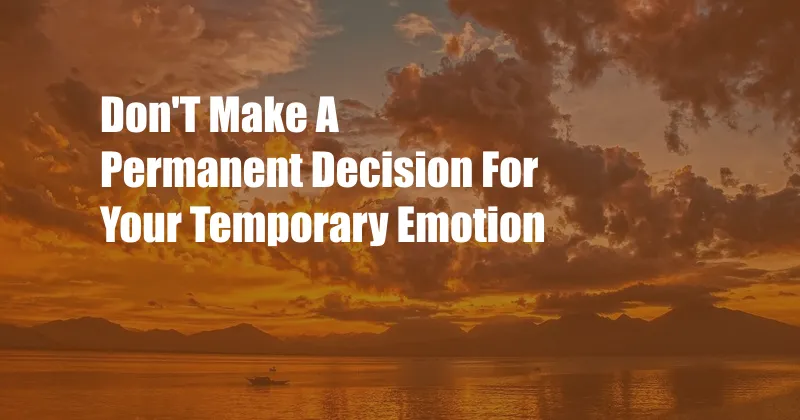
Don’t Let Temporary Emotions Guide Permanent Decisions
Introduction:
Imagine yourself standing at a crossroads, the weight of a life-altering decision bearing down on you. Amid the swirling emotions and the incessant chatter of your mind, you yearn for clarity. In those moments, it’s crucial to remember that the haze of temporary emotions should not cloud your judgment.
Your thoughts and feelings are like the ebb and flow of the tides, ever-changing and often influenced by external stimuli. If you make a permanent decision solely based on the emotions of the moment, you run the risk of regret when the tides turn.
The Pitfalls of Emotional Decision-Making
A Pause for Reflection:
Emotions, while powerful, can be deceptive. They can amplify our fears, distort our perceptions, and lead us down paths we might later come to regret. When emotions are running high, our logical thinking takes a backseat, leaving us vulnerable to impulsive decisions. It’s in these moments that we need to pause, to give ourselves time and space to process our emotions and consider the consequences of our actions.
A Deeper Understanding:
Emotional decision-making can stem from various triggers, such as fear, anger, or disappointment. These emotions can cloud our judgment and narrow our focus, making it difficult to consider the long-term implications of our choices. By recognizing these triggers and understanding their potential impact, we can better control our reactions and make decisions that align with our values and long-term goals.
The Benefits of Rational Decision-Making
A Path to Clarity:
In contrast to emotional decision-making, rational decision-making involves a conscious effort to weigh the pros and cons, consider different perspectives, and evaluate the potential consequences. This approach allows us to make choices that are aligned with our long-term interests and values.
A Framework for Wise Choices:
There are several frameworks and techniques that can help us make more rational decisions. These include:
- Pros and cons lists: Listing the potential benefits and drawbacks of each option can help us weigh the alternatives more objectively.
- Seeking multiple perspectives: Consulting with trusted friends, family members, or experts can provide valuable insights and help us avoid blind spots.
- Delaying decisions: Giving ourselves time to calm down and gather more information can help reduce the influence of emotions on our decision-making.
Tips for Making Rational Decisions
Trusting Your Gut:
While emotions can sometimes lead us astray, our intuition can also be a valuable guide. If, after careful consideration, you have a strong gut feeling about a particular decision, it’s worth listening to. This is especially true when the decision is aligned with your values and long-term goals.
Expert Advice from a Seasoned Blogger:
As a blogger with years of experience, I’ve learned the importance of separating emotions from decision-making. Here are some tips I’ve found helpful:
- Practice mindfulness: Paying attention to your thoughts and feelings without judgment can help you identify emotional triggers and reduce their impact on your decision-making.
- Seek out diverse perspectives: Surround yourself with people who have different viewpoints and experiences. This will broaden your perspective and challenge your assumptions.
- Don’t be afraid to ask for help: If you’re struggling to make a decision, don’t hesitate to reach out to trusted friends, family members, or professionals for support.
FAQ: Common Questions on Emotional Decision-Making
Q: How can I know if I’m making an emotional decision?
A: Some signs that you may be making an emotional decision include:
- Feeling overwhelmed or unable to think clearly
- Being excessively influenced by fear, anger, or sadness
- Rushing into a decision without considering the consequences
Q: What are the long-term consequences of emotional decision-making?
A: Emotional decision-making can lead to a variety of negative consequences, such as:
- Regret and dissatisfaction
- Damaged relationships
- Financial problems
- Missed opportunities
Conclusion: A Call to Action
We all experience temporary emotions that can influence our thoughts and actions. However, it’s crucial to recognize when our emotions are clouding our judgment and to make decisions based on rational thinking and a clear understanding of our long-term goals.
So, the next time you find yourself facing a life-altering decision, take a pause, breathe deeply, and ask yourself: “Is this a decision I’m making based on my temporary emotions, or is it one that aligns with my values and long-term aspirations?” By asking this question, you empower yourself to make choices that will lead to a more fulfilling and regret-free life.
Are you interested in learning more about the impact of emotions on decision-making? Share your thoughts and experiences in the comments below!